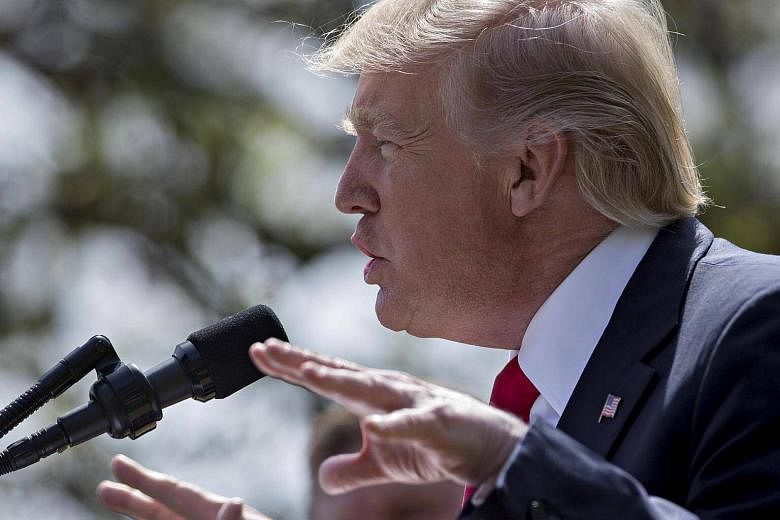When United States President Donald Trump meets China's President Xi Jinping, Mr Trump's key concerns will be trade and North Korea.
The issue of China's activity in the South China Sea will be discussed but is likely to be overshadowed.
They will also be watched for how they get along. Mr Trump is mercurial, while Mr Xi is studied and assured. Mr Xi does not play golf, so that icebreaker will be absent from their 24 hours at Mr Trump's estate.
The Trump administration is expected to be aggressive on trade. The two countries represent 40 per cent of the global economy. The US' trade deficit with China was US$347 billion (S$485 billion) last year.
An annual US report on foreign trade barriers released last week listed trade barriers in China, including forced technology transfers, online piracy and a ban on US beef.
"We want to reduce the systemic trade and investment barriers they have created which lead to an uneven playing field for US companies," a senior White House official said on Monday at a briefing.
North Korea's recent string of missile and rocket engine tests, and the United States' deployment of its Terminal High Altitude Area Defence anti-missile system in South Korea in response, will be another thorny issue. The US wants China to rein in North Korea. Mr Trump told The Financial Times: "If China is not going to solve North Korea, we will."
China discourages talk of a military response and objects to the deployment of the anti-missile shield.
But at the Monday briefing, the White House official said: "The clock has now run out, and all options are on the table."
US Secretary of State Rex Tillerson's public remarks on a visit to Beijing last month were careful, describing the Sino-US relationship as one built on "non-conflict, non-confrontation, mutual respect and win-win cooperation".
Mr Charles Freeman, managing director for China at Washington-based consultancy Bower Group Asia, told The Straits Times: "It is still unclear what the core tenets and strategic thrust of the Trump administration's China policy actually are."
Both Mr Xi and Mr Trump are "strongman" leaders. Mr Xi faces the 19th National Congress of the Communist Party of China later this year and will be looking to maintain his stature as a leader.
"This (the summit) is about appearances, and neither side can afford to look like they are being concessionary," Mr Freeman said.
Ms Bonnie Glaser, a senior adviser for Asia at the Centre for Strategic and International Studies in Washington, said at a seminar on March 31: "Friction… is inevitable, in my view, across a range of issues."
She added: "My guess is that Xi Jinping… wants to get through the 19th party congress knowing that the US-China relationship is mostly positive and stable."
The general perception is that the US expects China to deliver on two key things - trade and investment and North Korea, Ms Yun Sun, a fellow at the Stimson Centre in Washington told The Straits Times.
"China will be very eager to accommodate the US on issues that are negotiable. China is most likely going to deliver a 'gift package' (of) infrastructure investment and job creation, and make non-vital concessions on North Korea," she said.
Mr Trump issued an executive order last week ordering the Department of Commerce to fully examine and report particularly on the reasons for persistent trade deficits - in effect, postponing the imposition of tariffs for a few weeks.
Mr Freeman said: "That should assure the meeting won't blow up because of rhetoric on trade."

